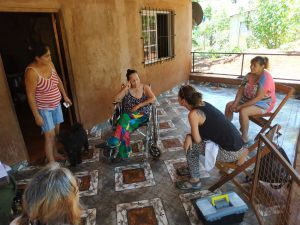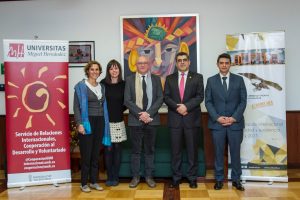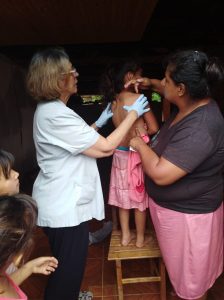COOPERATING AROUND THE WORLD
Agenda 2030, COOPERACIÓN Y VOLUNTARIADO, voluntariado
Agenda 2030 - 2, Cooperación al Desarrollo, voluntariado UMH
24 October 2019
UMH commitment to development cooperation is reflected in the multitude and range of projects set in motion in recent years
To speak of development cooperation at the Miguel Hernández University of Elche (UMH) is to speak of commitment to active listening about the educational, health, and research needs in different regions of the planet, but it is also to speak of the transfer of knowledge. All of this is visible in the development cooperation projects the UMH has carried out during the previous three years in Argentina, Brazil, Colombia, Democratic Republic of the Congo, Ecuador, Gambia, Ghana, Mozambique, Nicaragua, Paraguay, Peru, Rwanda, and Senegal. These represent commitment to collaborate, and they offer academic, training, and economic resources to other communities in order to ensure human rights. To achieve these objectives, the UMH has collaborated with the Consellería of Transparency, Social Responsibility, Participation and Cooperation of the Generalitat Valenciana through university development cooperation projects that have been established since 2016.
These projects are based on Master Plan III of Valencian Cooperation (2014-17) and Master Plan IV of Valencian Cooperation (2017-20), which establish development cooperation objectives for the defense and advancement of human rights while assuming the principles that make up sustainable human development. Both documents highlight the essential role given to the UMH as a public Valencian Community academic institution, a center that creates knowledge and applies research to development, whose aim is to foster sustainable human development through involvement by the university community.
University development cooperation projects have enabled the implementation of training and awareness-raising actions and development cooperation projects included in the 2030 Agenda for Sustainable Development of the United Nations. This agenda, which counts on participation by the 193 UN member states, establishes 169 targets from the 17 Sustainable Development Goals as a blueprint for achieving a better and more sustainable world.
Implementation
The Public Health Training with a Focus on Gender Equality for Social Work Technologists under the Framework of the SDGs at the Colegio Mayor Bolívar de Cartagena de Indias Technological Institution (Colombia) project, carried out by Department of Agrochemistry and Environment associate professor Fernando Bornay, was made possible by a 2016 agreement between the UMH and Generalitat Valenciana. This program consisted of 26 training workshops directed at female leaders in six communities comprised of families displaced by violence, poverty, or climate phenomena. The purpose of its workshops was to stimulate empowerment from a gender perspective and produce an environment conducive to development and well-being. The program also provided training for the faculty and student body of social promotion at the Colegio Mayor Bolívar Technological Institution as educational multipliers in the prevention of early pregnancy and sexually transmitted diseases.
The next agreement signed between the Valencian Community institutions in 2017 enabled the start of two development cooperation projects, both of which are ongoing. In the first, Cooperation in Academic Training and Research in Health Sciences with the National University of Amazonía Peruana, Iquitos (Peru) and its Health Institutions, José Manuel Ramos, a health sciences part-time lecturer from the UMH Department of Clinical Medicine, coordinates two refinement courses on HIV/AIDS infection at the National University of Amazonía Peruana. The continuity of this project made it possible for Alejandro Quiroz, a medical resident at the Regional Hospital of Loreto, to receive training at the UMH on new procedures and diagnoses in the care for HIV patients. As Ramos explains, “This is one of the poorest regions in Peru; therefore, it’s important that its health personnel learn to use new diagnostic and health care tools.”
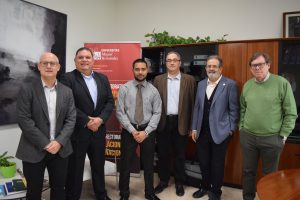
Investigators from the UMH Institute of Research, Development and Innovation in Sanitary Biotechnology of Elche with Vicente Micol, Vice Rector for International Relations, and Juan Jose Ballesta, Development Cooperation and Volunteerism Area Director.
Also during the same year, Training and Skills in Prevention-Diagnosis of Environmental and Health Factors in Nicaragua, proposed by Professor Emeritus Eugenio Vilanova, was set in motion. This work aims to improve the capabilities of Nicaragua to address chronic kidney disease, an environmental health problem that affects all of Central America where patients have a life expectancy of less than two years. This project brought Ariel Arias, a general practitioner associated with the National Autonomous University of Nicaragua, to train at the UMH and conduct research with the Toxicology and Environmental Health research group at the Institute of Bioengineering on the causes associated with this disease. During his stay, Arias highlighted the importance of the collaboration with the UMH when he stated, “Being able to create intervention strategies for chronic kidney disease patients directly affects the quality of life, and consequently, Nicaragua’s ability to develop.”
Another line of action marked by the 2017 university cooperation agreement is the call for UMH support to fund international research projects to achieve the SDGs. This support has enabled the execution of four development cooperation projects—in Ecuador, Mozambique, Rwanda, and the Triple Frontier between Argentina, Brazil, and Paraguay—that address the SDGs of No Poverty, Good Health and Well-Being, Quality Education, Gender Equality, Decent Work and Economic Growth, and Reduced Inequalities. As the SDGs are interrelated, these projects also aim to help fulfill the remainder of the 2030 Agenda, thus achieving all of the established goals.
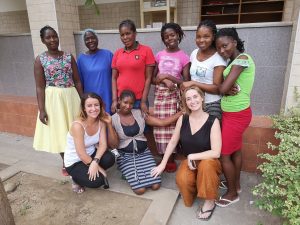
Lucy Parker, UMH assistant professor, and Elisa Chilet, a UMH investigator, with cooperation project participants in Chokwe.
Moreover, the agreement signed in October 2018 laid the foundations for UMH cooperation for the current academic year, during which work has already begun on two other international cooperation projects. The one presented by Juana Aznar, an associate professor from the Department of Economics and Financial Studies, with the Uniminuto University of Colombia is based on creating actions that promote gender equality with income earned by rural women in the South American country. Because the economic resources generated by these women represent a fundamental role in improving the conditions for their families and communities, the project strives to increase the income that they obtain by providing training in workshops that support their business initiatives. As such, this project fosters the empowerment of women and sets actions in motion that enable raising the standard of living and ensuring basic needs for their families.
Meanwhile, the team led by Professor José Navarro Pedreño, from the Department of Agrochemistry and Environment, has begun work on the Soil Conservation, Sustainable Management and Local Development in the Dindefelo Natural Community Reserve in Senegal project in collaboration with the Jane Goodall Institute of Spain (IJGE). Aiming to contribute to IJGE goals, the UMH is facilitating the availability of sustainable resources and development for Senegalese society. It accomplishes this by transferring knowledge, providing training to the social stakeholders involved—especially women—in the rural societies of the nature reserve, and by encouraging agricultural economic activities that ensure the supply of food through the cultivation of native crops.
As can be seen, all the cited projects have been developed in conjunction with local organizations and institutions in the different countries where they are implemented, and all forged out of prior knowledge and understanding of the needs and requests from the corresponding communities, directly affecting their populations. Based on these characteristics, it can be affirmed that UMH development cooperation actions receive direct involvement by the faculty and researchers who participate in them. Moreover, there is involvement from the institution itself by maintaining a line of continuous action, committed to cooperation as an instrument for transferring knowledge and improving living conditions for people.
Volunteerism as an engine for change
UMH involvement goes beyond development cooperation; since from its very beginnings, the institution has fostered involvement by the university community in volunteering efforts in collaboration with local and international organizations alike. Through the Area of Development Cooperation and Volunteerism, the UMH maintains direct contact with entities such as the Cruz Roja, Cáritas, Elche Acoge, Vega Baja Acoge, Asociación Conciénciate, Centro de Transfusiones de Alicante, Vicente Ferrer Foundation, ADACEA, Fundación 5P, and the Bodhi Tree Educational Foundation. Thanks to informative talks, workshops, and events promoting university volunteerism, hundreds of students have taken part in different volunteer programs, offering their time, knowledge, and will in support of actions that improve adverse realities and living conditions for groups at risk of social exclusion.
